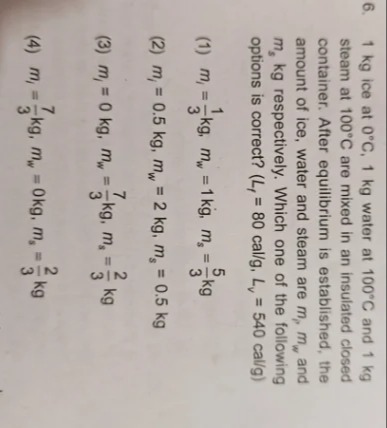Question
Question: 1 kg ice at 0°C, 1 kg water at 100°C and 1 kg steam at 100°C are mixed in an insulated closed contai...
1 kg ice at 0°C, 1 kg water at 100°C and 1 kg steam at 100°C are mixed in an insulated closed container. After equilibrium is established, the amount of ice, water and steam are mi, mw and ms kg respectively. Which one of the following options is correct? (Lf = 80 cal/g, Lv = 540 cal/g)

mi=31kg, mw=1kg, ms=35kg
mi=0.5 kg, mw=2 kg, ms=0.5 kg
mi=0 kg, mw=37kg, ms=32 kg
mi=37kg, mw=0kg, ms=32 kg
mi=0 kg, mw=37kg, ms=32 kg
Solution
Explanation:
-
Choose 100°C water as the energy reference (energy = 0).
- Steam at 100°C (when condensed to water at 100°C) gives an extra 540 cal/g.
- Ice at 0°C requires 80 cal/g to melt plus 100 cal/g to heat from 0°C to 100°C, i.e. a deficit of 180 cal/g.
-
For 1 kg (1000 g) of each:
- Ice “energy” = –180 × 1000 = –180,000 cal.
- Water energy = 0 cal.
- Steam energy = +540 × 1000 = +540,000 cal.
-
Total energy = 540,000 – 180,000 = +360,000 cal.
-
Let final mass of steam = mₛ (in grams); then its energy above water = 540 mₛ (cal). For the system at 100°C, the leftover energy is carried by the steam so:
540 mₛ = 360,000 cal → mₛ = 360,000/540 = 666.67 g = 2/3 kg. -
Since total mass = 3 kg, the water mass m_w = 3 kg – (mass of steam) = 3 – 2/3 = 7/3 kg, and no ice remains (m_i = 0).
Answer:
m_i = 0 kg, m_w = 7/3 kg, m_s = 2/3 kg → Option (3)
